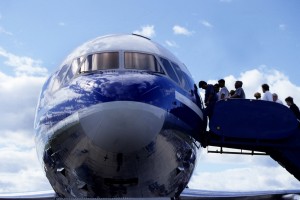 I just returned from one of my longer road trips of the year, and it’s great to be home!
I just returned from one of my longer road trips of the year, and it’s great to be home!
Believe it or not, I used to enjoy business travel. But now, with all the airport security, flight delays, baggage fees, and surly attitudes of airline employees, it has become the least favorite part of what I do for a living. I still love working with different clients around the country. But the “getting there” has become a wearisome task I would gladly eliminate if I could.
I did, however, have a real eye-opener on this latest trip.
I always caution my clients about the importance of not falling victim to our thought bubbles (the unspoken attitudes, assumptions and beliefs that govern how we think and act in the world). While sitting in yet another airport waiting for my flight to board, I experienced a vivid reminder of just how powerful they can be.
One of my pet peeves with air travel has always been how long it takes to board the airplane. Apparently I’m not alone, because while reading The Week magazine I came across an article about an astrophysicist who thinks he’s devised a better way. In fact, he believes his method, which he has tested using computer modeling and real people, would cut boarding times in half.
His approach goes like this: first seat families and anyone else needing assistance. Then, instead of seating groups of passengers from back to front as airlines currently do, fill all the window seats first. Start at the back of the plane and move forward by odd or even rows (30A, 28A, 26A, etc.) – but only on one side of the plane. When that side is full, repeat this process on the other side. When all the window seats are filled, use the same pattern to fill the middle seats and then the aisles.
The astrophysicist calculates that his method could save airlines hundreds of millions of dollars per year, not to mention a bushel of time for passengers. But so far he hasn’t heard from a single airline.
Here’s where the thought bubbles come in.
You might think that my initial response would have been, “What a great idea!” Or that I would have rushed up to the counter and asked the airline employees to give it a try. But no. The first thought that came into my head was one that has been repeated countless times in corporate boardrooms around the world: that will never work!
And then, to reinforce my not-so-original thought, my brain immediately began filling in all the reasons why it wouldn’t work. The airlines would have to retrain employees and change all their procedures. Passengers would have to show up on time and have their boarding passes ready. Frequent flyers would have to give up their priority boarding positions. Everyone would have to pay close attention to which seat was boarding at what time. People will never change their behavior in airports. That’s just the way it is.
You might also think that as the reigning “guru of thought bubbles” I would have immediately caught myself and said, “Holly, you silly! Stop indulging in your thought bubbles. You know better than that!” Instead, when my brain ran out of thought bubbles about why the idea wouldn’t work, I merely turned the page of the magazine and moved on to the next article. And sat there waiting while the plane boarded very slowly.
It wasn’t until I got home several hours later and mentioned it to my husband that the lights came on. Here was an idea that could potentially save millions of dollars while streamlining a major time-wasting activity. Yet I rejected it out of hand based on unproven assumptions bubbling up from my subconscious.
I don’t know if this idea will work or not. After all, it would require major behavioral change on the part of the airlines and passengers. But 9/11 sure changed our behavior in terms of the security measures we’re willing to put up with. And so far we have no hard data that this boarding method won’t work. So who knows?
The real issue for business leaders is how many times in our companies do we kill a good idea or overlook a potential opportunity because “it will never work?” And that’s the real danger of thought bubbles. When we’re buying into ours (because they reinforce what we want to believe), someone else might be challenging theirs and looking at things very differently. And that someone could be the next competitor that puts us out of business.
United, Delta, American, Southwest – there’s a guy out there who doesn’t buy into the thought bubble that we can’t board your airplanes more efficiently. Are you listening?






